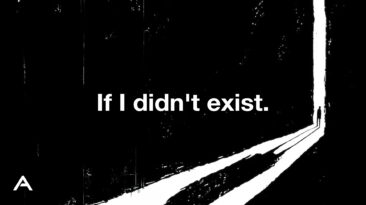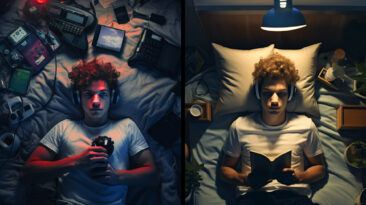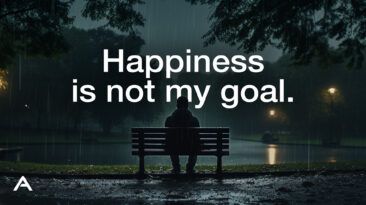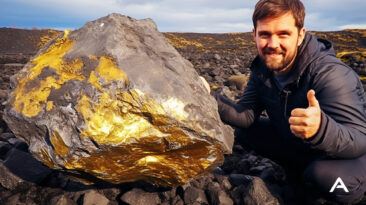Everyone loves Shower Thoughts. It’s the most successful format on this channel. There’s an entire subreddit dedicated to Shower Thoughts, and thousands of TikToks daily, talking about profound ideas, paradoxes and concepts. Things that you tend to think about when you’re in the shower.
A couple of days ago, I got stuck when I was trying to come up with ideas for the next episode in the series. And so a shower break, hoping that would clear my head.
As you would expect, I was hit with a shower thought, this one different than the rest. As the water poured over me, I thought, “Why do we have so many brilliant ideas in the shower?”
You can spend hours thinking about things like whether or not you should stay with your partner, the error in the code you’ve been debugging for a week, or how to start a story. But it’s only when you stop and do something mundane like showering or going for a walk that the answer sort of finds you.
How is it that I can be so relaxed, not thinking about anything in particular, just standing in the soothing warm rain, and the answer to a problem that has baffled me for ages suddenly pops into my head?
This is the science behind shower thoughts, the secret to our most brilliant ideas.
These ideas often come during a creative impasse. You’re stuck on a problem and focusing hard on a solution doesn’t seem to get you anywhere. That’s when you take a shower or go for a walk, and the solution pops into your brain. An “Aha” moment.
These are moments of realization. Where we suddenly think of the solution to a problem, get a joke, or finally have a personal realization. Have you ever been out for a walk and realized your relationship is doomed? Or maybe you’ve been in a shower, and the idea of quitting your university program started to feel like the right thing to do.
When these thoughts occur, it feels like they’ve been launched into our awareness from deep inside us. We weren’t actively thinking of them, yet they came to us.
A group of Belgian psychologists suggested that these moments of insight spring up from the unconscious mind rather than our active reasoning mind. There’s a give-and-take between conscious and subconscious processes during these ‘aha’ moments.
These same psychologists used a word association puzzle in a study to learn more about these moments. They wanted to see if participants were more likely to find an answer in a shower thought or a conscious thought.
The study asked participants to think of a word that could be combined with pine, crab, or sauce to make a new word.
Psychologists believed that the puzzle would be difficult while working on it actively because the conscious mind is only good at recognizing strong associations. The answer to the puzzle is a weak association, meaning it’s more likely that the unconscious mind will push the answer forward in an ‘aha’ moment. Stick around, I’ll give you the answer at the end of the video.
It’s like walking home from an exam when the correct answer to a question suddenly hits you, and you curse yourself for not getting it right during the test. Your subconscious mind pushed the answer forward, just not at the right time.
Cognitive neuroscientist Mark Beeman has an excellent analogy for the process of solving creative problems. He said it’s like trying to see a dim star at night. You have to look out of the corner of your mind.
These thoughts likely arise from our brain’s default mode network or DMN. Our constellation of brain regions is active when our thoughts turn inward, such as when our mind wanders.
When you get one of these moments, the answer or realization you get tends to feel right. It’s the answer you’d been looking for, and you found it without even trying. But are the insights you get in the shower better than those you get from the conscious mind?
Actually, yeah.
In the same word-association study, shower thought solutions were correct 94% of the time – compared to just 78% for conscious solutions.
Now, one limitation of this study is that these are solutions to problems with clearly-defined answers. Most problems don’t have clear answers, they have many possibilities that work better or worse.
I’ve had a lot of ‘aha’ moments on creative projects that were ultimately scrapped. Still, the ideas I’m most proud of came from these eureka moments.
I know that when I go for a walk or take a shower, I’m more likely to have these moments of realization. But what exactly is triggering them? What inspires these ideas to reveal themselves from my subconscious?
Showers, walks, and other mundane tasks enable something pretty significant for these moments: mind wandering,
You might think your mind wanders during most activities that don’t require your full attention. And that’s true, but the kind of mind wandering that leads to ‘aha’ moments is special. It sits in that sweet spot of an an activity that’s engaging enough to keep the conscious mind preoccupied but not engaging enough to be real work.
If you’re playing a video game that requires your total concentration, you’ll probably not have any breakthroughs. And if you’re doing something that bores you, then your mind isn’t occupied enough.
You need some of your attention to be free to wander off, but not all of it. Boring activities tend to lead to your mind wandering but in a completely different way. Instead of looking inward, your brain looks outward, trying to save itself from boredom.
One thing we often overlook when talking about Shower Thoughts is all the work that has to be done before you step foot in the shower.
The most famous Shower Thought is the story of Archimedes’ Eureka moment in the bath.
As the story goes, he was trying to solve a problem for a local tyrant named Hiero. Hiero wanted to know if his goldsmith was stealing the gold he gave him to make a crown and was using a silver alloy instead.
While in the bath, Archimedes realized that the more his body sunk into the tub, the more water poured out of it, and that the displaced water was an exact measure of his volume. He concluded that if the crown was made of silver, it would have to be bulkier in order to be the same weight as a crown of gold. And a bulkier silver crown would displace more water than a pure gold crown.
Archimedes, the math whiz, leaped out of the tub and ran home naked, crying, “Eureka, Eureka,” which translates to “I found it.”
You probably also know the story of Isaac Newton sitting under an apple tree when an apple fell and hit him on the head, inspiring him to develop the law of universal gravitation.
The thing about these stories is that there’s no evidence to suggest they’re true. The story of Archimedes was written in Rome 200 years after the described event, and Newton, as far as historians can tell, was never hit on the head by an apple.
But these ‘eureka’ moments make for great stories, which is why they circulate so widely. The thought of a solution striking you suddenly rather than coming from a moment of concentration is much more dramatic and exciting. It’s much better for the screenplay. Rather than showing someone researching at the library, slowly seeking answers.
Strokes of genius make for better stories, but is that really how we develop our best ideas? Or are these stories hiding the fact that we’ve put in a lot of hard work and time?
Before you can have a stroke of genius, you need to do the work. Sitting around waiting for a ‘eureka’ moment won’t get you anywhere.
Your brain needs to be primed for that moment with new knowledge. That means getting out of your comfort zone and exploring. Let your intellectual curiosity guide you. Maybe take up a hobby or visit a place you’ve never been to.
The next step is essential. You have to take all the thoughts that arise from your new knowledge and explore them. Focus on these experiences and consider how they can help your problem. It may not be initially obvious why your new interest in cricket will help you design a new logo, but it’s worth exploring. And only by exploring will you find anything.
Ask yourself how to do things differently and explore the new things you’ve learned. This is how creative individuals come up with their unique solutions. They draw on something they’ve learned outside of what they’re working on.
The renowned video game company, Nintendo, is known for hiring people with notable hobbies unrelated to gaming. The long-time producer of the Legend of Zelda series, Eiji Aonuma, used to create mechanical dolls before working at Nintendo. His designs impressed Mario and Zelda creator Shigeru Miyamoto so much that they hired him.
If you’ve ever had a Eureka moment, you know that the answer always feels like it’s been staring you in the face the entire time. That’s because you knew it. You studied it, but your brain just hadn’t made the necessary connection yet.
Your brain can’t come up with something it doesn’t know, no matter how longer you spend under the shower.
Now that we know what needs to be done beforehand, here’s how to get out of a creative slump and, hopefully, find what you’re searching for. Eureka!
First of all, your mind needs to relax. The shower isn’t some sacred shrine. The only reason it works is because, for most of us, it’s one of the few places our minds can relax. If it doesn’t work for you, find an environment or activity that does.
Think about places and tasks that have helped you create ‘aha’ moments before. Pursue them. Try meditating to focus and relax your mind. You may notice that five minutes into the meditation, ‘aha’ moments are storming into your brain, trying to break your concentration. Try to wait to let them in, or it defeats the purpose of the exercise.
Next, you need to allow yourself a break. Permit yourself to let the work go temporarily. If you’re trying to relax for the sole purpose of generating new ideas, it won’t work because you’re still actively working.
You have to let go completely; only then can you find what you’re looking for. It’s the backward law, a philosophy I’ll explore in a future video.
When you get your ‘aha’ moment, find a way to store it. Record a voice memo, write it down with pen and paper, heck, draw the answer to the equation in your bar of soap. Just find a way to save it because if you don’t, the idea might wash away as fast as it came.
And lastly, enjoy those shower thoughts and the satisfaction they give you. Take them as your brain rewarding you for all your hard work.
Oh, and P.S., the answer to that word association puzzle is apple; pineapple, crabapple, applesauce. You’re welcome. Let me know if you got it in the comments section below. Here’s a playlist of all my shower thoughts; I hope you enjoy it.



















